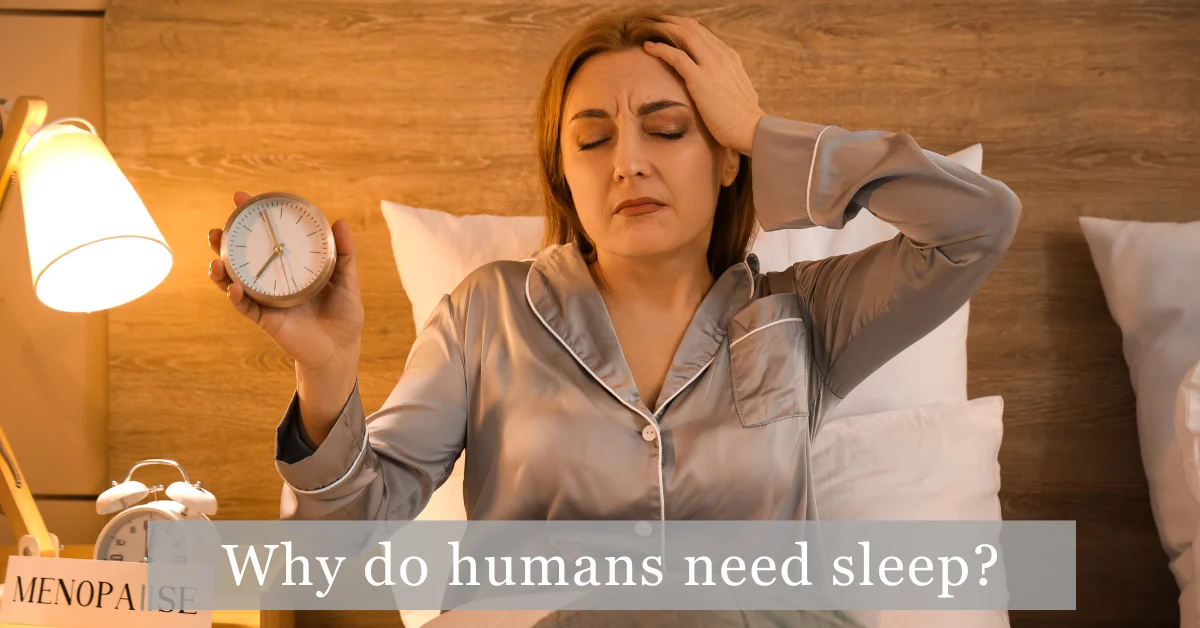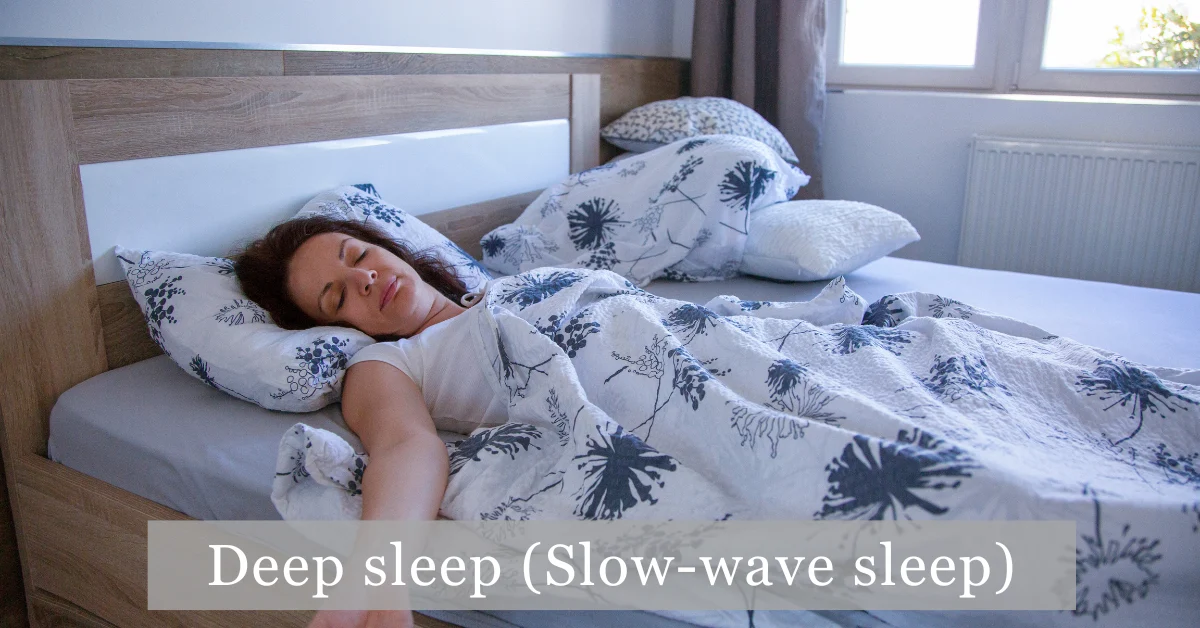Sleep plays an important role in human life. A restful night can lead to a beautiful, energetic day. In today’s blog, we will learn how much sleep you need by age, what deep sleep is, rem sleep meaning and why do humans need sleep!
Why do humans need sleep?
Humans need sleep because it’s an important process for maintaining physical, mental, and emotional health. During sleep, the body maintains important roles that are required for survival and well-being. Here’s why do humans need sleep:

- Physical Restoration: Sleep helps the body to repair and grow. During deep sleep, tissues heal, muscles grow, and cells renew. It also helps boost the immune system, making us more resilient against infections.
- Brain Function and Memory: Sleep plays a vital role in learning and memory. While we sleep, the brain consolidates information gathered throughout the day, which is important for maintaining knowledge.
- Emotional Health: Sleep affects mood and emotional stability. When we lack sleep, we’re more likely to feel stressed, anxious, or irritable. Regular sleep lack has been connected to mental health issues like depression and anxiety.
- Energy Conservation: Sleep helps save energy. During rest, metabolic rates drop allowing the body to maintain resources, which makes it easier to handle energy-intensive activities when awake.
- Detoxification and Waste Removal: The brain has a unique waste clearance system (the glymphatic system) that becomes more active during sleep. It removes toxins and byproducts, keeping the brain healthy and reducing the risk of neurodegenerative diseases like Alzheimer’s.
- Hormone Regulation: Sleep helps balance hormones that handle hunger, stress, growth, and mood. For example, good sleep regulates cortisol (the stress hormone) and maintains a balance of hunger-related hormones, which helps control hunger and metabolism.
Sleep is the most important process that supports nearly every function in the body. A lack of sleep can lead to various health issues, such as impaired immunity, memory problems, emotional instability, and increased risk of chronic illnesses.
Deep sleep meaning
Deep sleep (Slow-wave sleep) is one of the most important parts of sleep when your body and brain get their best rest. It happens in the first half of the night, and it’s important for keeping you healthy.

What Happens During Deep Sleep
- Slow Brain Activity: During deep sleep, your brain slows down a lot, producing slow, steady waves. It’s a big difference between the lighter stages of sleep and the stage where we usually dream.
- Body Repairs Itself: This is the time when your body does its “repair work.” It fixes muscles and tissues, builds stronger bones, and boosts the immune system (which helps you fight off illnesses). Growth hormones are released during this stage, which is important for muscle recovery and growth.
- Heart Rate and Breathing Slow Down: Your heart beats slower, and you breathe more steadily. This helps your heart and lungs get some much-needed rest.
- Less Dreaming: People don’t usually have dreams in deep sleep like they do in REM sleep (the stage with rapid eye movement). Dreams are either very light or hardly happen.
- Hard to Wake Up: It’s tougher to wake someone up from deep sleep. If you do get woken up, you might feel a bit groggy or “out of it” for a little while.
Why Deep Sleep Is So Important
Physical Health: Deep sleep heals and restores your body, so deep sleep is important if you want to feel rested and stay healthy. Without enough deep sleep, you will feel physically tired and more likely to get sick easily.
Memory and Learning: This stage helps you remember things you learned during the day. It boosts your memory, which makes it easier to learn new things.
Mood and Emotions: Deep sleep helps you manage your emotions. Without it, you might feel more irritable, stressed, or anxious.
Deep sleep is the part of sleep that really lets your body and brain recharge. It’s less common as you get older, but it’s still one of the most important stages to keep you feeling your best.
REM sleep meaning
REM sleep, or Rapid Eye Movement sleep, is a unique stage of sleep where most of our dreaming happens. It’s named after the quick, random movements of the eyes that occur during this time. REM sleep usually starts about 90 minutes after we fall asleep and happens several times throughout the night, with each REM period getting longer as the night goes on.
How much sleep do you need by age
The amount of sleep a person needs varies by age, as sleep requirements decrease as we grow older. Here are general guidelines for How much sleep do you need by age:

- Newborns (0–3 months): 14–17 hours per day
Newborns sleep in short bursts throughout the day and night, slowly developing a regular sleep habit.
- Infants (4–11 months): 12–15 hours per day
Infants start sleeping longer at night and take naps during the day.
- Toddlers (1–2 years): 11–14 hours per day
Toddlers usually sleep through the night and may take one or two naps during the day.
- Preschoolers (3–5 years): 10–13 hours per day
As preschoolers get older, they might only need one nap, and their night sleep becomes more consistent.
- School-age children (6–13 years): 9–11 hours per day
School-age children often need a good night’s sleep to support growth, learning, and development.
- Teenagers (14–17 years): 8–10 hours per day
Teens usually have changing sleep patterns due to hormones, so they may feel tired later in the evening and need more sleep in the morning.
- Young adults (18–25 years): 7–9 hours per day
Young adults usually need a steady amount of sleep, though many in this age group don’t get enough due to lifestyle factors.
- Adults (26–64 years): 7–9 hours per day
Adults generally require less sleep than younger people, though getting at least 7 hours is important for health.
- Older adults (65+ years): 7–8 hours per day
Older adults might find it harder to stay asleep for long periods and may benefit from naps during the day.
These ranges are general guidelines, and individual needs can vary. Factors like lifestyle, health, and stress can also influence how much sleep a person needs to feel fully relaxed.
Conclusion
Getting enough sleep is important for good health and well-being at every stage of life. As we age, our sleep needs change, with newborns requiring the most sleep and older adults needing slightly less.
A regular sleep routine can help you stay healthy, which is very important for your mental and physical well-being. If you have your opinion about today’s post, you can let me know through the comments. Your comments will motivate me to write more informative posts.
